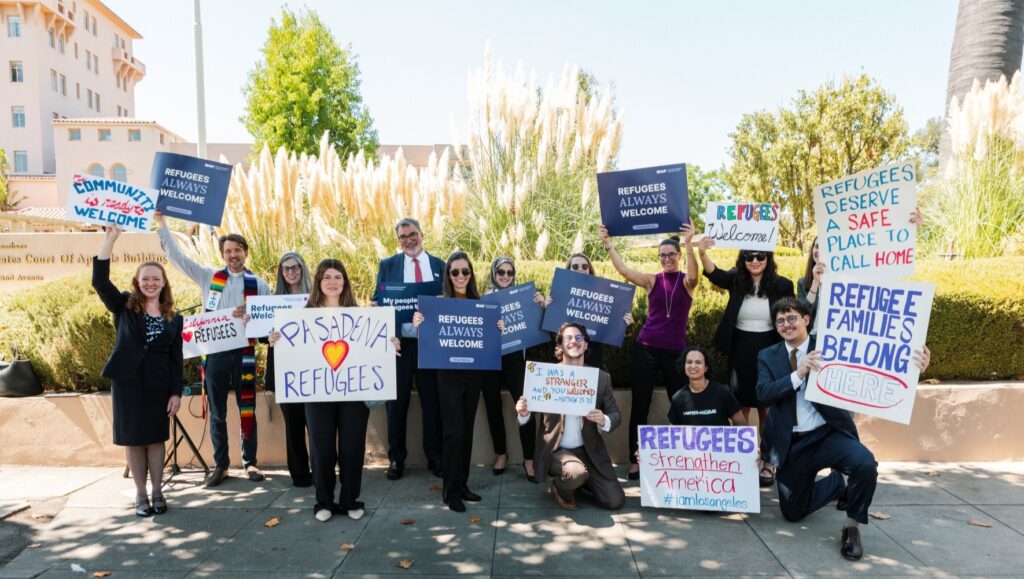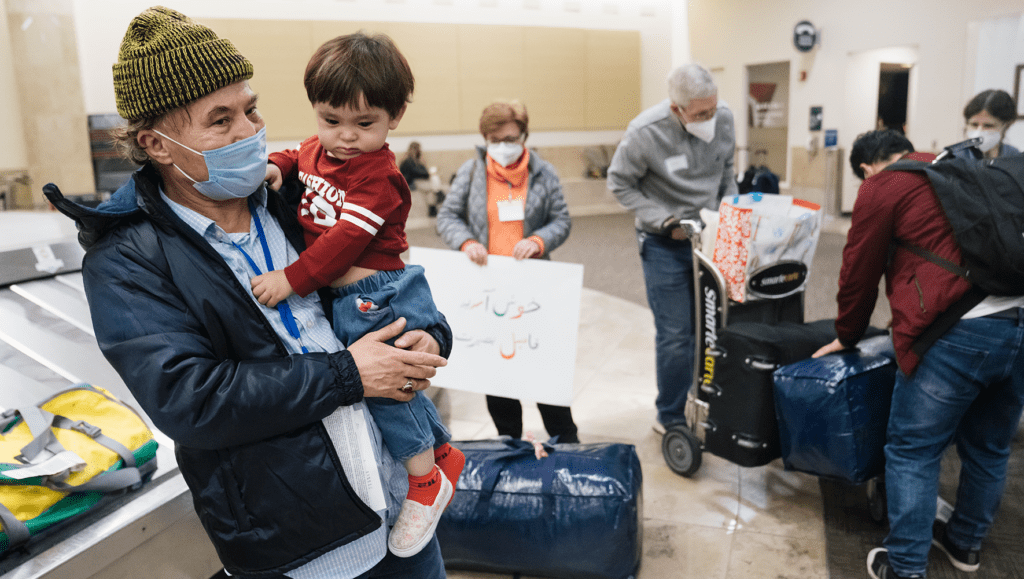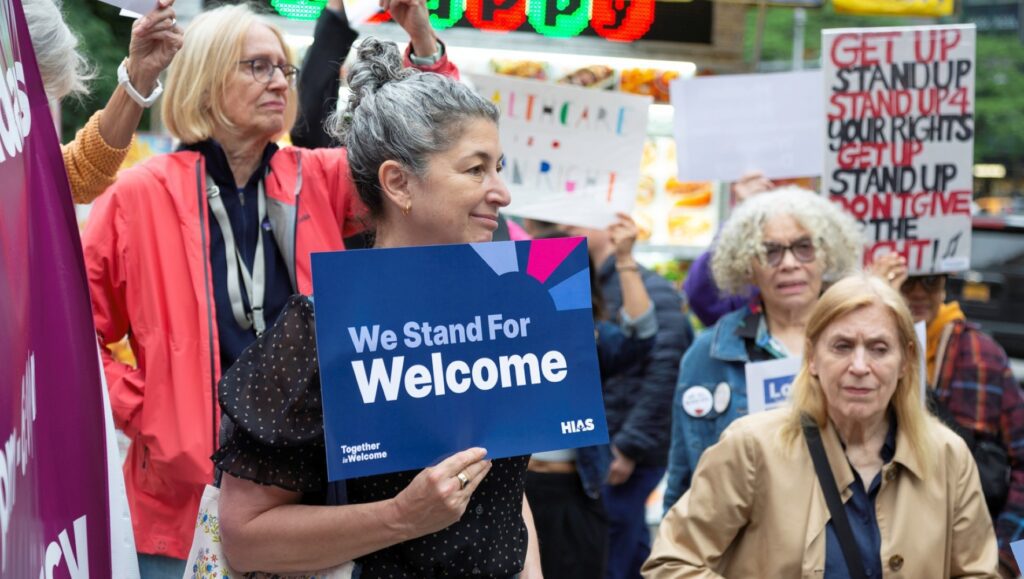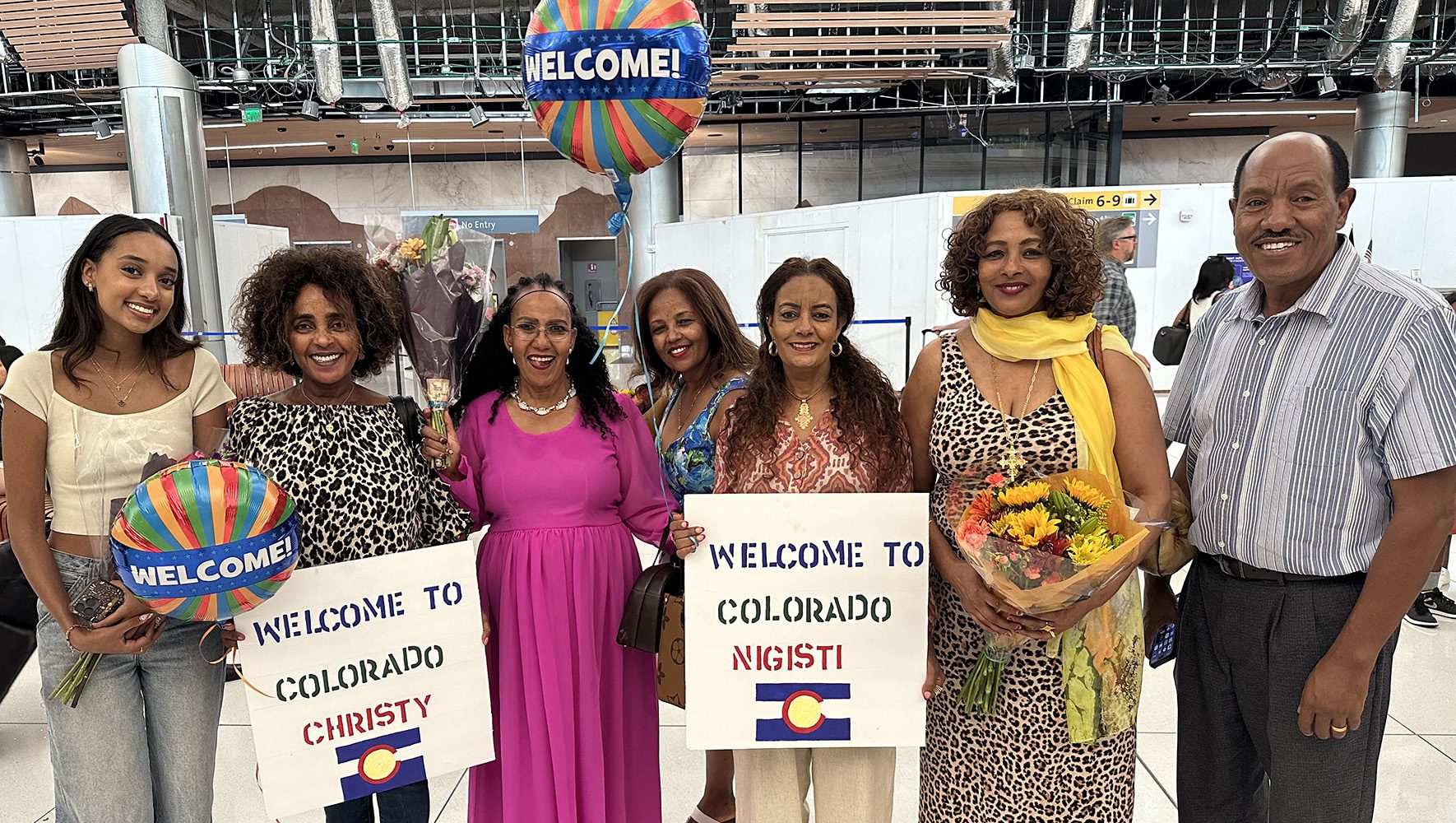
In the wake of an election characterized by strong anti-immigrant rhetoric, many in the U.S. are wondering what comes next — and what we can do to help.
The incoming administration campaigned on many policies that would be dangerous and harmful to immigrants and refugees, including mass deportations and closing the border to asylum seekers. Despite the challenging road ahead of us, HIAS is ready to fight back with the help of supporters around the U.S., and to advocate for policies that help displaced people find welcome, safety, and opportunity.
Rabbi Sarah Bassin, HIAS’ rabbi-in-residence, recently wrote: “As an organization, HIAS has borne witness to more than half of American history and has seen the nation at its best and worst.” HIAS has weathered administrations that are actively hostile to our work before, and through it all we have continued to fight for a better future for displaced people.
No matter what happens, we do know that we won’t be alone. HIAS will need our community of supporters to stand alongside us in support of refugees, as you have in the past.
It is a critical moment to act, and you don’t need to wait until the next administration takes office in January to find ways to help. Across the country, organizations, communities, and mutual aid groups are working each and every day to welcome refugees, asylum seekers, and other displaced people and immigrants. Whether you connect with HIAS or with a local organization in your area, now is the time to dig in and show up for refugees.
Here are five ways that you can help right now:
1. Sponsor refugees through the Welcome Corps
Apply to the Welcome Corps to sponsor refugees who are waiting to come to the United States.
Private sponsorship through the Welcome Corps is one of the most direct ways that Americans can put their values of welcome into action. This program, established in 2023, allows volunteers to sponsor refugees from around the world. This makes a profound impact on the lives of those refugees while also expanding the country’s resettlement capacity.
Through the Welcome Corps, a group of five or more vetted volunteers provides initial financial, resettlement, and emotional support to a refugee family or individual as they acclimate to their new community and life in the U.S. These groups can apply to sponsor refugees that they know or to be matched with refugees in need of resettlement.
HIAS is a Private Sponsor Organization for the Welcome Corps. This means HIAS supports private sponsor groups at every step of their journey, from helping them develop a welcome plan and budget to providing ongoing training and support through office hours and dedicated staff.
In October, one such private sponsor group made up of HIAS employees welcomed a refugee family from Syria to the Washington, D.C. area.
“For years, I have heard countless stories from the sponsors and refugees that I’ve worked with: stories of challenges and triumphs, of communities growing stronger, of new friendships forged with newcomers and with existing neighbors,” said Andrea Gagne, HIAS’ senior program manager for private sponsorship and a member of the sponsor group. “But nothing prepares you for doing this work hands on. It is unbelievable how motivated our community has been to help our new neighbors get back on their feet. I feel more inspired than ever before to continue doing this work.”
We encourage interested groups to apply as soon as possible. To match most quickly with an individual or family already approved for resettlement, consider not including a preference for nationality or language in your application.
Additionally, groups that apply for matching currently qualify automatically for a generous sponsor fund that will cover 60% of the amount required to sponsor a refugee. The remaining amount can be raised after the application is submitted. Airbnb housing credits will also be available for up to 30 days, which will allow the sponsor group more time to find permanent housing for the arriving family.
"Nothing prepares you for doing this work hands on. It is unbelievable how motivated our community has been to help our new neighbors get back on their feet. I feel more inspired than ever before to continue doing this work."Andrea Gagne, HIAS’ senior program manager for private sponsorship
2. Connect with a local resettlement organization in your area
Reach out to your local resettlement partner to see how you can help refugees in your area – whether through community sponsorship, volunteering, or in-kind donations.
HIAS works with a network of resettlement partners — local Jewish and secular service agencies working in 30 cities across the country to help refugees resettle and integrate into their new communities. But these organizations can’t do it alone. Local communities have always played a major role in helping their new neighbors thrive and put down strong roots — and are needed more now than ever.
From organizing and contributing to furniture drives to providing interpretation services, there are many ways that communities can help their local organizations support refugees. Resettlement partners may have short- or long-term volunteer opportunities for assisting refugees, or they may be more in need of financial or in-kind donations at this time. Connect with an organization near you to learn how you can best leverage your skills and resources to help refugees in your own backyard.
One way you can get involved is by organizing a community sponsorship group with your friends and neighbors. Similar to private sponsorship, community sponsorship groups work with a local agency to take on some (but not all) of the responsibilities involved in helping a refugee family or individual resettle in their area. Groups, usually of eight or more people, work with the organization to determine where they can best support newcomers. For example, they may help refugees find employment and enroll children in school, or they may be more involved in locating housing and applying for benefits. In addition to helping refugees meet their basic needs and reach important milestones toward self-sufficiency, these groups also help refugees build relationships and become more integrated into their local community.
Another way to help resettlement organizations across the country is by connecting agencies to affordable housing options.
“Safe refuge is not possible without a safe place to call home,” said Kate Poor, HIAS’ housing specialist. “In the midst of an affordable housing crisis, the biggest challenge refugees face upon arrival in the U.S. is accessing long-term housing.”
HIAS is seeking real estate partners who are willing to rent to refugees supported by HIAS resettlement partners. If you have, or know someone who has, rental properties near HIAS’ resettlement partners, please reach out here.
Connect with an organization near you to learn how you can best leverage your skills and resources to help refugees in your own backyard.
3. Support asylum seekers through HIAS and local organizations
Help asylum seekers navigate a new start in your community – whether through HIAS’ programs in New York and Washington D.C. or in partnership with local organizations.
Asylum seekers often come to the U.S. in the immediate wake of a crisis and are not eligible for most public benefits while they wait for their cases to be decided. Working out of our offices in New York City and Silver Spring, Maryland, HIAS’ volunteer programs help provide wraparound services, mentorship, and support to HIAS’ legal clients — and beyond.
“With larger numbers of asylum seekers and migrants arriving in the NYC and D.C. areas over the last few years, we knew that we had to step up our efforts to meet this moment,” said Lilly Sandberg, HIAS’ volunteer coordinator. “We collaborate with partner organizations on the ground to see how our volunteers can plug in to support the wider asylum-seeking community outside our own client base.”
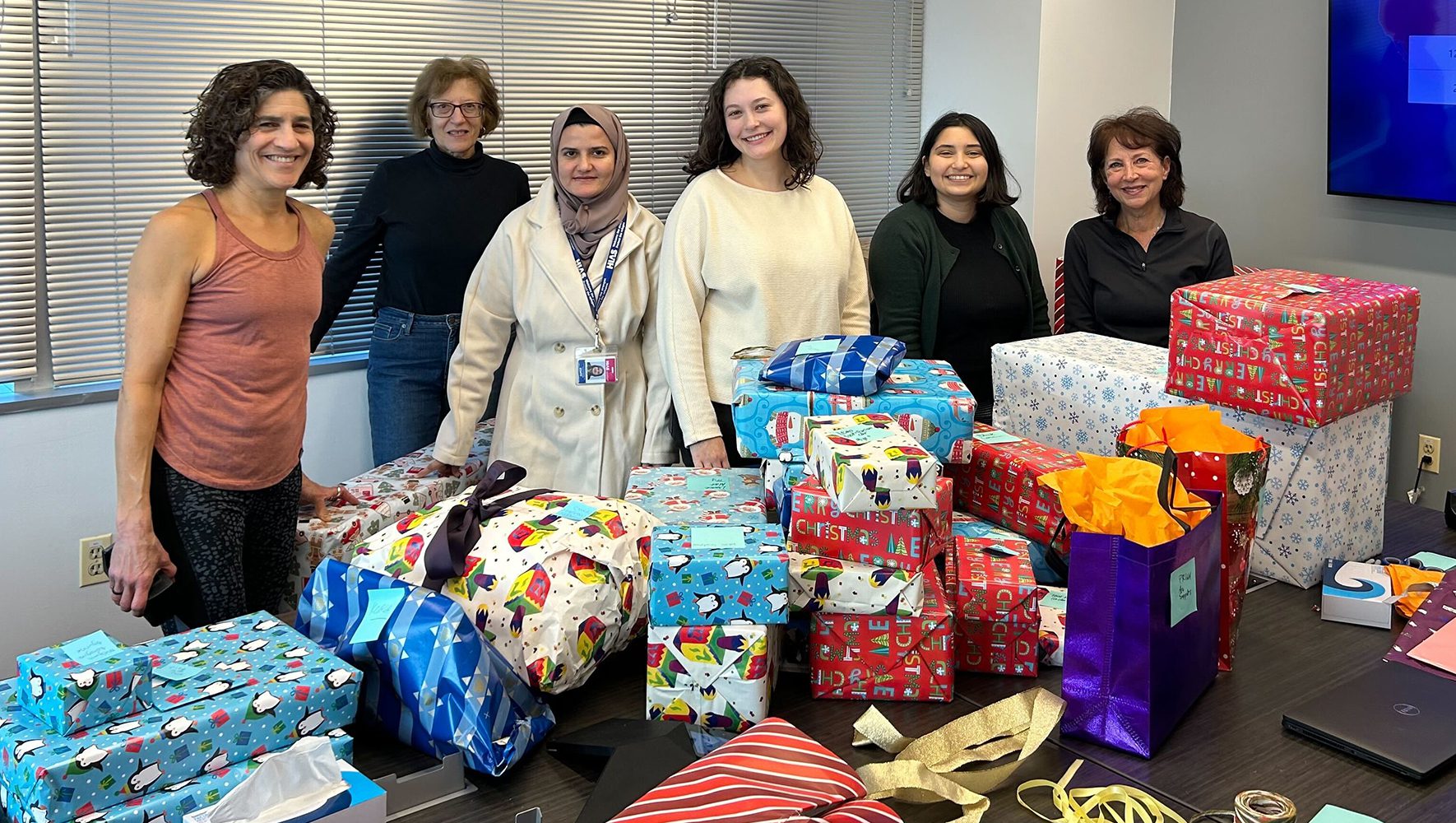
HIAS staff and volunteers pose with a pile of toys they have finished wrapping. The gifts were donated as part of a holiday toy drive for HIAS legal clients and their families at HIAS’ headquarters in Silver Spring, Maryland on December 11, 2023. (Caroline Wolinsky/HIAS)
One way to volunteer with asylum seekers is through direct service, in which volunteers are trained to work one-on-one with people seeking asylum. Long term volunteer opportunities include mentoring asylum seekers, helping them navigate systems like healthcare and public transit, and serving as English language tutors or conversational partners.
Volunteers might also work with clients on a shorter-term basis to meet a specific goal, such as polishing their resume, applying for a new social security card, or finding affordable housing. HIAS volunteers speak a combined 20 languages, and often offer their skills for interpretation or translation.
HIAS volunteers can also provide indirect support to asylum seekers by compiling resource guides, organizing donation drives, and writing letters of solidarity and compassion to people in immigration detention.
Not in NYC and D.C.? Seek out organizations and mutual aid groups supporting asylum seekers and migrants in your area to learn how you can get involved.
“With larger numbers of asylum seekers and migrants arriving in the NYC and D.C. areas over the last few years, we knew that we had to step up our efforts to meet this moment."Lilly Sandberg, HIAS’ volunteer coordinator
4. Provide legal support to displaced people
Join our pro bono network to support displaced people on their immigration journeys.
Looking to assist displaced people with your legal expertise? HIAS works with attorneys and law students across the United States to help refugees, asylum seekers, and other forcibly displaced people access critical immigration legal services.
HIAS’ pro bono network is a vital part of our U.S. legal programs, adding to the work of HIAS’ dedicated staff attorneys in New York City and Silver Spring, Maryland. Participants receive training and resources to assist people seeking humanitarian relief in the United States. Given the ever-changing nature of U.S. immigration law, HIAS regularly shares updates and hosts online trainings to keep volunteers up to speed on the latest trends and policy changes.
“One of the most important aspects of being part of HIAS’ pro bono network is staying in knowledgeable about immigration policy,” said Sarah Burrows, HIAS’ director of pro bono and partnerships. “It enables volunteers to prepare themselves for pro bono opportunities available through our network, and also empowers them to bring this information back to their own communities across the country.”
One important area of work for HIAS’ pro bono network is guiding HIAS clients in their next steps on their immigration journeys: for example, representing clients as they apply for green cards and citizenship.
“We want to ensure that our clients are as protected as possible in the coming years, and the best way to do that is to get them on the pathway to more permanent legal status,” said Burrows.
Opportunities for pro bono attorneys to take on a case or client shift regularly in response to the needs of forcibly displaced populations. Volunteer attorneys can help forcibly displaced people in many meaningful ways, from staying in the loop on changes to immigration policy to providing legal support to clients before immigration court and U.S. Citizenship and Immigration Services (USCIS). Some opportunities are only available to attorneys located in the New York City and D.C. metro areas, but many aspects of the HIAS pro bono program are accessible to legal professionals across the United States.
“We want to ensure that our clients are as protected as possible in the coming years, and the best way to do that is to get them on the pathway to more permanent legal status."Sarah Burrows, HIAS’ director of pro bono and partnerships
5. Support HIAS’ work in the U.S. and around the world
Donate to HIAS to help us continue assisting displaced people and standing up for their rights in the U.S. and around the world.
For over 120 years, HIAS has provided vital services to refugees, asylum seekers, and other forcibly displaced and stateless persons around the world and advocated for their fundamental rights so they can rebuild their lives. Through every administration, we have continued to carry out our mission and to push the U.S. government to uphold the legacy of a country that is a beacon of hope for refugees seeking safety and that values the contributions of immigrants.
Donating to HIAS means helping displaced people like M*, an asylum seeker from Guinea who was targeted for persecution in his home country based on his political beliefs and cultural identity. After being arrested, tortured, and threatened with death multiple times, he fled the country — but was unable to bring his young children with him. He was further targeted for violence and extortion based on his race during his journey to the U.S.
In New York, M. became a HIAS client. While his experience would ordinarily provide a strong asylum claim, recent policies restricting asylum complicate his case. Navigating these rules without legal representation would be nearly impossible.
“It is a complex process,” said M. “If I didn’t have an attorney, I would not feel at ease. I would feel isolated and frustrated, like I could not do anything.”
Donating to HIAS also supports our work around the world, from GBV prevention and response programs in Israel to child protection programs for children in Ecuador who are separated from their parents or otherwise at high risk of violence.
Together, we can help create a world in which refugees find welcome, safety, and opportunity. Support our work with a donation today.
* Pseudonym used for client’s protection.
